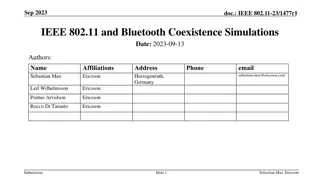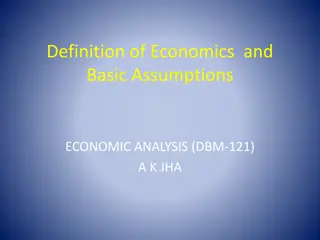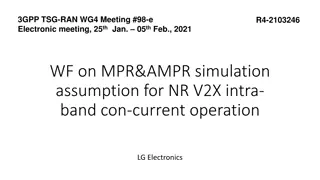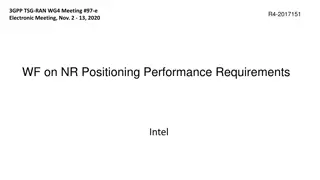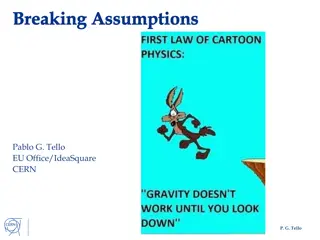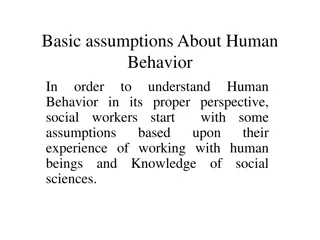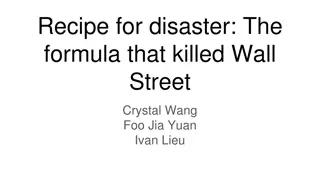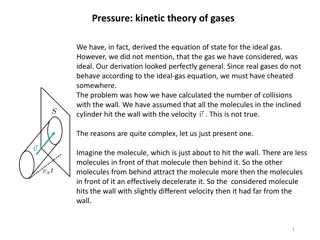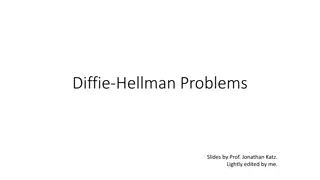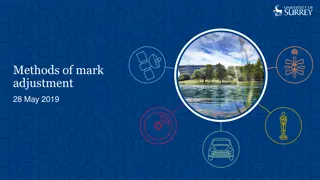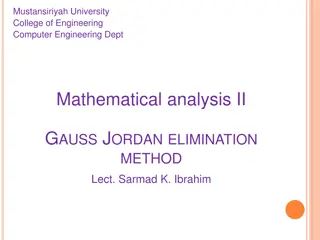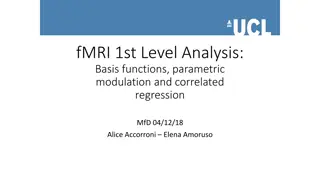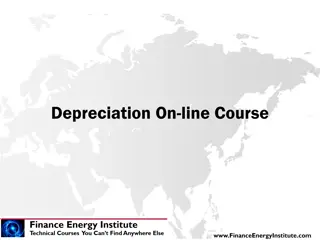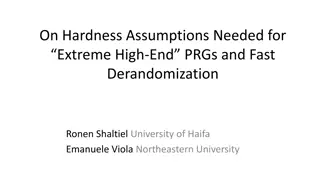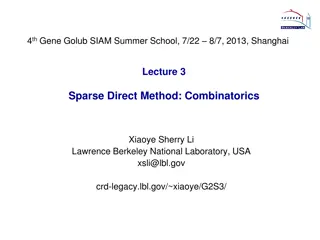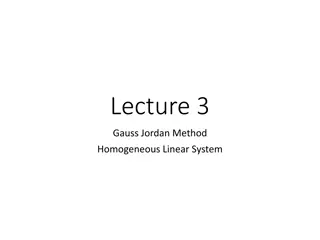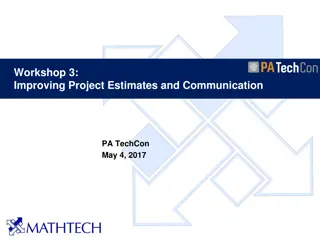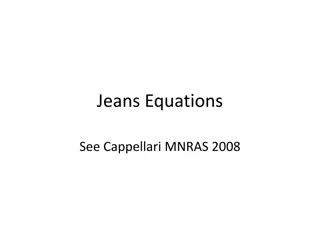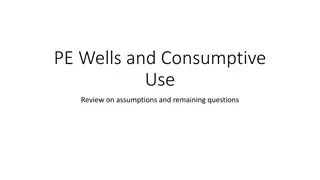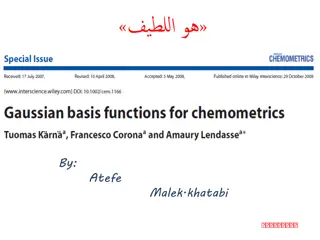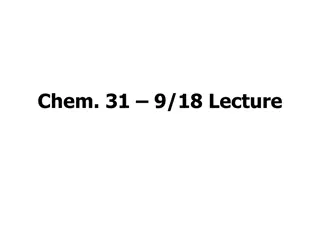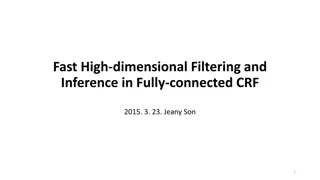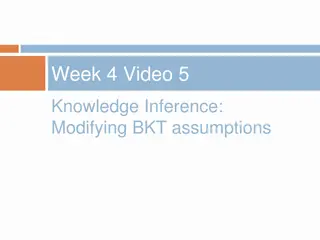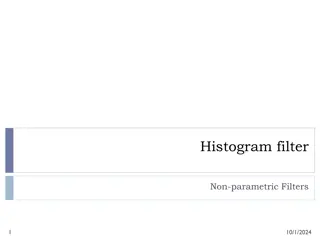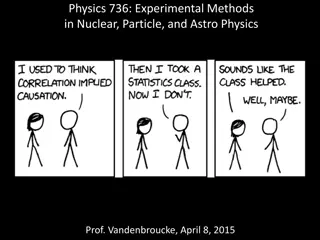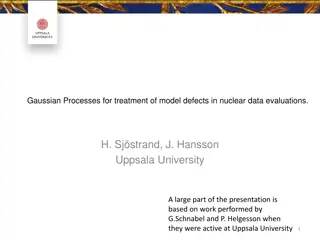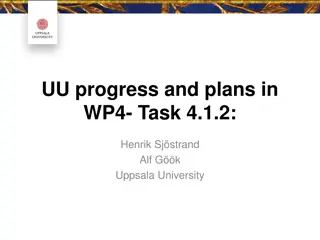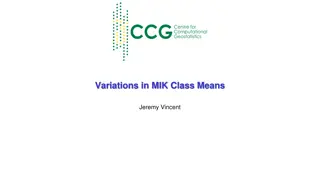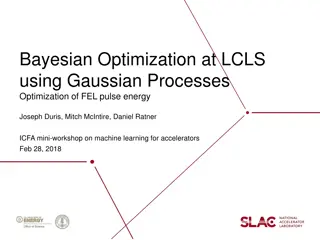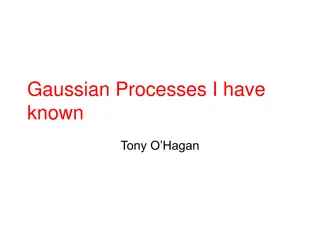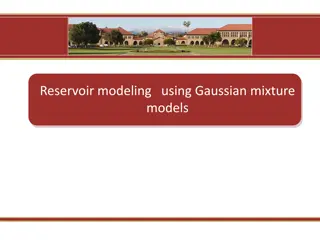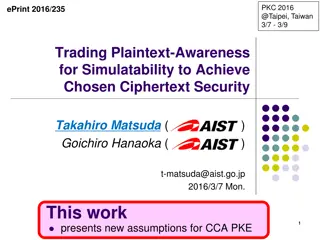IEEE 802.11 and Bluetooth Coexistence Simulations: Assumptions and Models
This document presents simulations on the coexistence of IEEE 802.11 (Wi-Fi) and Bluetooth technologies in the 5.945GHz to 6.425GHz spectrum. It explores various assumptions and models, including spectrum usage, channelization, scenario setups for Bluetooth and Wi-Fi links, and the capabilities of b
6 views • 54 slides
Analyzing Hydrologic Time-Series for Flood Frequency Analysis
This content delves into the methods and assumptions involved in studying hydrologic time-series data for flood frequency analysis. It covers topics such as different types of assumptions, including independence and persistence, and highlights how streamflow data can be analyzed to find annual maxim
7 views • 97 slides
Understanding Economics: Definitions and Basic Assumptions
Economics is a social science that examines how individuals, businesses, and governments allocate resources to satisfy unlimited wants in the face of scarcity. It involves decision-making processes and the study of human behavior in relation to the allocation of scarce resources. Basic assumptions l
0 views • 9 slides
Overview of RF Architecture and Waveform Assumptions for NR V2X Intra-Band Operation
In the electronic meeting of 3GPP TSG-RAN-WG4, discussions were held on the RF architecture and waveform assumptions for NR V2X intra-band operation in band n79. Various options and recommendations were presented regarding RF architecture, antenna architecture, and waveform definitions for efficient
1 views • 7 slides
3GPP TSG-RAN WG4 Meeting #97-e Summary
The 3GPP TSG-RAN WG4 Meeting #97-e held an electronic meeting to discuss NR positioning performance requirements. Agreements were made in the first round, with discussions ongoing in the second round. The work plan focuses on performance parts based on SA testing, with a detailed WP available in the
1 views • 11 slides
Unlocking Creativity and Innovation: Lateral Thinking vs Logical Thinking
Embrace the power of lateral thinking to challenge assumptions, generate new possibilities, and break free from traditional logic. Discover how logical thinking and lateral thinking differ in their approach to problem-solving, and learn how to leverage both methods to spur creativity and innovation.
1 views • 35 slides
Key Assumptions About Human Behavior for Social Workers
Human behavior is purposeful, meaningful, driven by conscious and unconscious motives, influenced by multiple factors, and shaped by early life experiences. Social workers rely on these assumptions to understand human behavior effectively.
0 views • 6 slides
Unraveling the Gaussian Copula Model and the Financial Collapse of 2008
Explore the dangers of relying on the Gaussian copula model for pricing risks in the financial world, leading to the catastrophic collapse of 2008. Discover how the lure of profits overshadowed warnings about the model's limitations, causing trillions of dollars in losses and threatening the global
7 views • 18 slides
Insight into Kinetic Theory of Gases and Maxwell Velocity Distribution
The discussion delves into the kinetic theory of gases, highlighting the deviations from ideal gas behavior and the derivation of the Maxwell velocity distribution. It explores the intricacies of molecule-wall collisions, Maxwell's assumptions, the Gaussian distribution, and the concept of reversibl
0 views • 8 slides
Understanding Diffie-Hellman Problems in Cryptography
Exploring Diffie-Hellman assumptions and problems including Computational Diffie-Hellman (CDH) and Decisional Diffie-Hellman (DDH). Discusses the difficulty of solving the DDH problem compared to CDH and discrete logarithm assumptions. Covers examples and implications of these cryptographic challeng
0 views • 6 slides
Methods of Mark Adjustment in Educational Assessment
In educational assessment, methods like Z-score normalization, quadratic scaling, and piecewise linear scaling are used to adjust marks based on Gaussian distribution assumptions. Z-score normalization helps to adjust both mean and standard deviation, impacting the distribution of marks. Quadratic s
4 views • 25 slides
Understanding Gaussian Elimination Method in Linear Algebra
Gaussian Elimination and Gauss-Jordan Elimination are methods used in linear algebra to transform matrices into reduced row echelon form. Wilhelm Jordan and Clasen independently described Gauss-Jordan elimination in 1887. The process involves converting equations into augmented matrices, performing
4 views • 14 slides
Understanding the Gaussian Distribution and Its Properties
This insightful content dives into the Gaussian Distribution, including its formulation for multidimensional vectors, properties, conditional laws, and examples. Explore topics like Mahalanobis distance, covariance matrix, elliptical surfaces, and the Gaussian distribution as a Gaussian function. Di
0 views • 19 slides
Understanding fMRI 1st Level Analysis: Basis Functions and GLM Assumptions
Explore the exciting world of fMRI 1st level analysis focusing on basis functions, parametric modulation, correlated regression, GLM assumptions, group analysis, and more. Dive into brain region differences in BOLD signals with various stimuli and learn about temporal basis functions in neuroimaging
0 views • 42 slides
Developing Strategic Thinking Skills through Comprehensive Analysis
Strategic thinking involves challenging assumptions, understanding the whole picture, and exploring new ideas. By shadowing to gather insights and understanding current workflows, barriers, and assumptions, one can develop a system view and experiment with innovative solutions to drive strategic obj
0 views • 5 slides
Alternative Depreciation Method for Modeling PPE Balance
In the context of modeling the balance of existed Property, Plant, and Equipment (PPE) for start-ups and fast-growing IT companies, the challenge lies in determining retirement rates with limited information. The approach involves making assumptions about starting retirement levels and growth rates,
4 views • 11 slides
Navigating Statistical Inference Challenges in Small Samples
In small samples, understanding the sampling distribution of estimators is crucial for valid inference, even when assumptions are violated. This involves careful consideration of normality assumptions, handling non-linear hypotheses, and computing standard errors for various statistics. As demonstra
0 views • 19 slides
Insights on Hardness Assumptions for Extreme PRGs
BPP=P requires certain complexity theoretical hardness assumptions. Recent advancements aim for extreme high-end PRGs based on stronger assumptions, presenting challenges in black-box proofing and loss factors. The cost of hybrid arguments for PRGs is analyzed, highlighting the need for qualitativel
2 views • 14 slides
Santa Monica College 2022-2023 Q1 Budget Update Presentation
This presentation outlines the budget update for Santa Monica College for the first quarter of 2022-2023. It covers major assumption changes, revenue assumptions, details of unrestricted and restricted general funds, including the Learning Aligned Employment Program and COVID-19 Recovery Block Grant
3 views • 15 slides
Overview of Sparse Linear Solvers and Gaussian Elimination
Exploring Sparse Linear Solvers and Gaussian Elimination methods in solving systems of linear equations, emphasizing strategies, numerical stability considerations, and the unique approach of Sparse Gaussian Elimination. Topics include iterative and direct methods, factorization, matrix-vector multi
0 views • 35 slides
Understanding Gaussian Elimination and Homogeneous Linear Systems
Gaussian Elimination is a powerful method used to solve systems of linear equations. It involves transforming augmented matrices through row operations to simplify and find solutions. Homogeneous linear systems have consistent solutions, including the trivial solution. This method is essential in li
0 views • 16 slides
Effective Project Estimation and Communication Strategies
Learn about the importance of accurate project estimates, common estimation pitfalls, key components of estimates, documenting assumptions, typical assumptions to consider, and understanding the difference between effort and duration in project planning. Enhance your project management skills for be
0 views • 22 slides
Understanding High Net Worth Client Gift Planning and Philanthropy
Explore the role of trusted advisors in philanthropy, the disconnect between HNW clients and advisors, philanthropic motivations and assumptions, gift planning for the future, and how financial, social, and personal factors influence giving decisions. Gain insights into primary motivators such as do
1 views • 18 slides
Understanding Jeans Equations in Stellar Dynamics
The Jeans Equations and Collisionless Boltzmann Equation play a crucial role in describing the distribution of stars in a gravitational potential. By applying assumptions like axial symmetry and spherical symmetry, these equations provide insights into the behavior of large systems of stars. Despite
0 views • 7 slides
Review on Wells and Consumptive Use Assumptions
This review focuses on projections and assumptions related to permit-exempt wells, growth rates, and baseline consumptive use in subbasins. Historical growth rates from 1999 to 2018 are analyzed to forecast future well connections. Growth allocation within subbasins is based on buildable lands analy
0 views • 13 slides
Functional Approximation Using Gaussian Basis Functions for Dimensionality Reduction
This paper proposes a method for dimensionality reduction based on functional approximation using Gaussian basis functions. Nonlinear Gauss weights are utilized to train a least squares support vector machine (LS-SVM) model, with further variable selection using forward-backward methodology. The met
0 views • 23 slides
Gaussian Statistics and Confidence Intervals in Population Sampling
Explore Gaussian statistics in population sampling scenarios, understanding Z-based limit testing and confidence intervals. Learn about statistical tests such as F-tests and t-tests through practical examples like fish weight and cholesterol level measurements. Master the calculation of confidence i
0 views • 8 slides
Fast High-Dimensional Filtering and Inference in Fully-Connected CRF
This work discusses fast high-dimensional filtering techniques in Fully-Connected Conditional Random Fields (CRF) through methods like Gaussian filtering, bilateral filtering, and the use of permutohedral lattice. It explores efficient inference in CRFs with Gaussian edge potentials and accelerated
0 views • 25 slides
Enhancing Bayesian Knowledge Tracing Through Modified Assumptions
Exploring the concept of modifying assumptions in Bayesian Knowledge Tracing (BKT) for more accurate modeling of learning. The lecture delves into how adjusting BKT assumptions can lead to improved insights into student performance and skill acquisition. Various models and methodologies, such as con
0 views • 51 slides
Understanding Economic Models: Assumptions, Deductive Reasoning, and Logical Fallacies
Economic models utilize deductive reasoning to simplify real-world economic relationships. Assumptions vs. implications are key components, where assumptions reflect reality or are simplifying. This process helps identify conditions for specific outcomes to occur and distinguishes between consequent
1 views • 17 slides
Advanced Emission Line Pipeline for Stellar Kinematics Analysis
This comprehensive pipeline includes processes for stellar kinematics, continuum fitting, Gaussian line fitting, and analysis of SAMI-like cubes. It also covers Gaussian fitting techniques, parameter mapping, and potential issues. The pipeline features detailed steps and strategies for accurate anal
0 views • 10 slides
Understanding Robot Localization Using Kalman Filters
Robot localization in a hallway is achieved through Kalman-like filters that use sensor data to estimate the robot's position based on a map of the environment. This process involves incorporating measurements, updating state estimates, and relying on Gaussian assumptions for accuracy. The robot's u
0 views • 26 slides
Understanding Statistical Distributions in Physics
Exploring the connections between binomial, Poisson, and Gaussian distributions, this material delves into probabilities, change of variables, and cumulative distribution functions within the context of experimental methods in nuclear, particle, and astro physics. Gain insights into key concepts, su
0 views • 13 slides
Gaussian Processes for Treatment of Model Defects in Nuclear Data Evaluations
Gaussian Processes (GP) are explored for treating model defects in nuclear data evaluations. The presentation discusses the impact of model defects on evaluation results and proposes using GP to address these issues. The concept of GP and its application in treating model defects are detailed, highl
0 views • 28 slides
Enhancing Nuclear Data Evaluation with Gaussian Processes
Uppsala University is investing efforts in developing the TENDL methodology to incorporate model defect methods for nuclear data evaluations. By leveraging Gaussian Processes and Levenberg-Marquardt algorithm, they aim to improve the accuracy and reliability of calibration data to produce justified
0 views • 16 slides
Analyzing Variations in MIK Class Means by Jeremy Vincent
The presentation delves into the MIK estimator, exploring its impact on estimation with constant class means and non-Gaussian data. Review of initial results, examination of class mean bias in upper tail, and implications for metal containment are discussed. Cross-validation study findings, future w
0 views • 9 slides
Bayesian Optimization at LCLS Using Gaussian Processes
Bayesian optimization is being used at LCLS to tune the Free Electron Laser (FEL) pulse energy efficiently. The current approach involves a tradeoff between human optimization and numerical optimization methods, with Gaussian processes providing a probabilistic model for tuning strategies. Prior mea
0 views • 16 slides
Understanding Gaussian Processes: A Comprehensive Overview
Gaussian Processes (GPs) have wide applications in statistics and machine learning, encompassing regression, spatial interpolation, uncertainty quantification, and more. This content delves into the nature of GPs, their use in different communities, modeling mean and covariance, as well as the nuanc
0 views • 50 slides
Reservoir Modeling Using Gaussian Mixture Models
In the field of reservoir modeling, Gaussian mixture models offer a powerful approach to estimating rock properties such as porosity, sand/clay content, and saturations using seismic data. This analytical solution of the Bayesian linear inverse problem provides insights into modeling reservoir prope
0 views • 10 slides
New Assumptions for Achieving Chosen Ciphertext Security in Cryptography
This research work focuses on presenting new assumptions for achieving chosen ciphertext security in public key encryption. The study aims to clarify the necessary and sufficient assumptions to realize general cryptographic primitives, particularly focusing on CCA secure PKE and KEM. The ultimate go
0 views • 27 slides
